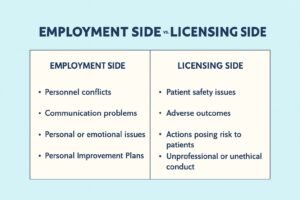Content Highlights
Physicians in Texas are no strangers to scrutiny, from credentialing committees to licensing boards. But when a hospital places you on an internal improvement plan, must you disclose it to the TMB?
In this article, we clarify the legal distinction between internal employment actions and mandatory reporting requirements under Texas law. Read on to learn more about your reporting obligations.
Are Physicians Required to Report an Internal Improvement Plan to the TMB?
No, an internal improvement plan does not trigger a reporting obligation to the TMB (Texas Medical Board), so long as the plan does not restrict your privileges, stem from a patient safety issue, or involve unethical conduct. For a more general discussion of reporting requirements, see “TMB Reporting Requirements: What Texas Physicians Need to Know.”
Hospitals and healthcare institutions often use internal performance or improvement plans (PIPs) to address concerns that do not rise to the level of formal discipline. These may involve targeted remediation, continuing education, or enhanced peer review. Importantly, these are internal employer-driven interventions, not regulatory actions.
What Hospital Department Governs Internal Improvement Plans?
HR or a similar department, such as “Academic Affairs,” generally handles internal improvement plans. In a practical sense, hospital physicians answer to both the “employment side” and also the “licensing side” of the hospital. Typically, the medical staff credentials committee controls the more serious issues that could affect your right to practice medicine at the institution. Here are examples of issues:

Under current Texas law, internal corrective measures are not reportable unless they escalate into disciplinary action that meets the statutory criteria for mandatory reporting to the TMB. Issues that trigger mandatory reporting fall on the licensing side of the hospital’s governance.
What Are the TMB’s Reporting Requirements?
The Texas Occupations Code and TMB rules impose specific reporting duties. The statute lists these duties based on defined scenarios. According to Texas Occupations Code § 160.002, a physician must self-report to the TMB when:
- Clinical privileges are restricted, revoked, or suspended for disciplinary reasons, or
- It has been determined that the physician may pose a risk to patient safety, or
- A physician resigns or withdraws during the pendency of an internal investigation, or
- There has been a finding of unprofessional or unethical conduct.
Another statute, 22 Tex. Admin. Code § 190.8, lists specific violations that could require reporting to the TMB.
What Risks Do Internal Improvement Plans Pose?
Though not inherently reportable, internal improvement plans can be legally and professionally precarious. Many physicians mistakenly view these plans as benign or temporary. But in practice, they may serve as a precursor to formal discipline, or worse, as leverage in a termination or negotiated resignation. These outcomes, if mishandled, can have downstream effects on credentialing, licensure, and future employment.
At Gardner Employment Law, we’ve represented physicians in situations that seemed innocuous in the beginning but turned into serious problems. I have handled cases in which certain members on the powerful credentials committee were determined to report the matter to the TMB as a disciplinary action.
That’s why we advise physicians to:
- Engage legal counsel immediately upon receiving a performance improvement plan of any type,
- Document all communications with the employer regarding the reason for placing you on the plan and the ultimate goal,
- Make sure your version of the incident in question is documented in the formal file,
- Avoid resigning under ambiguous terms that may later be construed as disciplinary, and
- Clarify whether any hospital action is being reported to external entities, including the TMB or NPDB (National Practitioners Data Bank).
In short, what begins as an internal HR process can evolve into a reputational and legal threat without proper safeguards.
What Should You Do Next?
If you’ve been placed on an internal improvement plan, take it seriously, but not fearfully. Understand that you are not automatically obligated to report it to the TMB, but you must be vigilant about how your employer frames and executes the process. Seemingly innocuous decisions can have unintended regulatory consequences if not managed strategically.
At Gardner Employment Law, we represent physicians and healthcare executives in matters involving TMB complaints, internal investigations, employment transitions, and licensing risk. We are well-versed in the interplay between hospital policies and TMB regulations.
We can help you protect your career, your credentials, and your professional standing.

